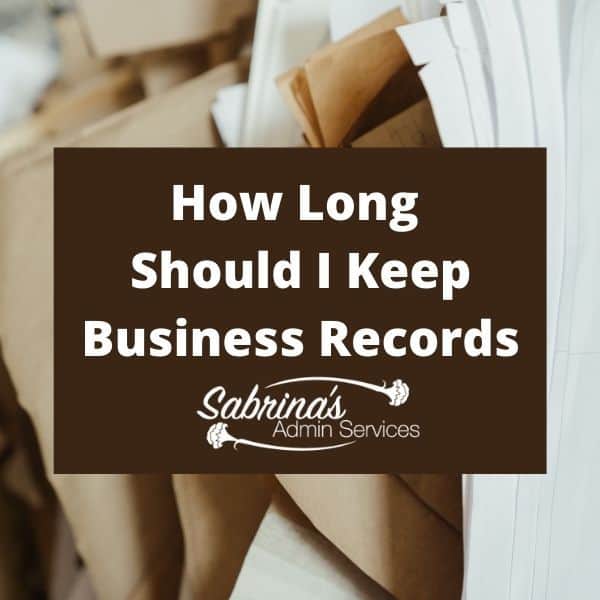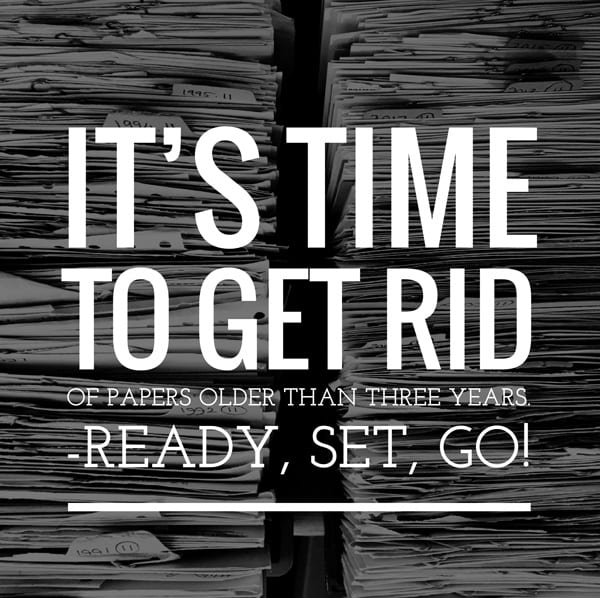How long do you keep your business files? Do you keep them forever or get rid of them after a specific time? Maintaining files for a business is different from keeping your files. Many business files need to be kept to varying lengths of time. Over the years, small business owners have asked me these questions. The IRS doesn’t have a clear, across-the-board answer to this question, so here is what I suggest. If you wish to visit the IRS.gov website, click here.
Topics Discussed
- First, let’s go through how long you should keep your personal records.
- How long does it take to keep general small business records?
- Items to keep in general small business records.
- Paperwork to keep for at least two years?
- Paperwork to keep for at least four years?
- Paperwork to keep for at least six years?
- Paper to keep indefinitely?
First, let’s go through how long you should keep your personal records.
You can review and shred personal files after three years if you haven’t been audited. Keep all the supporting documents that relate to your tax return, and get rid of the rest. Things to keep are W-2s, expense reimbursements, 1099s, mileage logs, itemized support paperwork like mortgage taxes, investment capital gains paperwork, etc. When should you shred? If the tax year is 2023 and you file/pay it in April 2024, you could go through the paperwork and shred it after April 2027.
Now, let’s talk about small business records.
How long does it take to keep general small business records?
Small businesses have many more types of paperwork to go through, and you will probably need to keep it longer. I recommend seven years for small businesses, but the IRS says three years. If you filed in April 2024, you should keep the files until 2030 or 2027 at the earliest. The IRS says that there are some exceptions. “Keep records for six years if you do not report income that you should report, and it is more than 25% of the gross income shown on your return. Or keep records indefinitely if you do not file a return. Or, keep records indefinitely if you file a fraudulent return.“
Items to keep in general small business records.
Income receipts: Cash register tapes, Deposit information (cash and credit sales), Receipt books, Invoices
Submitted forms: 1099s, W-2s submitted to IRS, and other informational documents
Expense receipts: Resale items, the material used, the cost of goods sold, canceled checks, electronic email receipts, credit card statements, bank statements, petty cash, travel, transportation, entertainment, gift expenses, etc…
Employment tax records: Keep employment tax records for at least 4 years after the tax becomes due or is paid, whichever is later.
Paperwork to keep for at least two years?
Keep canceled insurance policies for at least two years after the policy ended, especially if you had a claim. This is being conservative, but I would rather you be safe than sorry.
Paperwork to keep for at least four years?
Keep staff files for four years from when they left or were terminated.
The IRS explicitly mentions employment tax records, which are essential to keep safe and secure and must be shredded to protect everyone’s privacy. Keep employment tax records for at least four years after the tax payment date. So, if you pay your 941 in January for the 2019 4th quarter, you should keep your employment taxes until January 2023. However, I still think keeping payroll documents and payroll tax returns for seven years is safer. For more information about what to keep for your employment tax record keeping, please click here.
Visit our employee records post for more tips.
Paperwork to keep for at least six years?
Mortgage agreements or other asset documents, like machinery and furniture, are essential to keep. Be sure to keep information about your assets, like purchase price and date, cost of any improvements, Section 179 deduction taken, deductions taken for depreciation, deductions taken for casualty losses, such as losses resulting from fires or storms, how to use the asset, when and how you disposed of an asset, selling pricing if you sold it, expenses of sales. The invoices, real estate closing paperwork, canceled checks, and sales receipts should have this information in them.
Paper to keep indefinitely?
You also need to keep certain papers as long as the business is running. Here are a few examples.
Correspondences with clients (affiliate), employees, and colleagues (affiliate).
Correspondences that are in process or pending.
Business, corporation paperwork, stock records, profit-sharing paperwork, copyrights, etc…
Current insurance policies
Contracts with clients (affiliate) and staff
Some exceptions for indefinitely kept items
An exception could be if a client’s business is closed. Wait two years, and then get rid of these papers.
Before purging any business files, be sure to do your own research and contact your accountant to confirm with them your exact situation and what you can get rid of safely. Always remember that ALL these sensitive records must be disposed of in a proper way. Shredding the documents with a shredder like the ones below will maximize the security of all involved.
I hope this helps you and your business clear up paper clutter and get rid of it in the most effective and secure way.
Let’s continue the conversation. Do you have any tips on how to handle these records? Please leave a comment below.
Please note these are affiliate links through Amazon, and at no additional cost to you, I will earn affiliate fees if you decide to make a purchase.










Such excellent tips. I always wonder, because there are so many different deadlines and rules for type of records. Will be sharing.
Great info, Sabrina. I have also been told that different states require different times to keep documents as well. I am assuming this is especially if incorporated in a particular state. I too wonder if digital files are acceptable. Boxes and boxes of paper and receipts are cumbersome.
I can never remember all of the time spans, so I started keeping all paperwork (for an undetermined length of time). Except instead of paper, I scan them). Oftentimes I still keep the paper for approximately five years. Actually, we now have a filing system that tells us right on the tab how long to keep.
This reminded me to make an appointment with our accountant! Have to admit I have boxes of files going back years, I could probably have a good clear out sometime now.
I glad you broke it down, Sabrina. I have all kinds of different papers and was unsure if I could throw any of it away. Now I know. Thanks.
Great share and very valuable post Sabrina! Good to know how long to hold on to those papers and why it is important! Thanks for sharing 🙂
Super helpful tips… funny thing.. I still have many years that I don’t need to… and every year I take all annual statements and file the needed paperwork with my taxes and put them in an big envelope and file them all together… for storage.
This is fantastic advice. I am terrible at keeping records or maybe I should say that I am terrible at organizing records.
Thanks so much for these guidelines. I am always confused by how long to keep my business records. Of course I keep the tax returns forever it seems.
Great tips, as always, Sabrina! Kind of scary to be thinking about 2024 – !!!!!! – but I guess that’s why you’re the organized one, here! I just got sticker shock from the number!
I struggle with this. Keep it or shred it. This is a handy guide. Thanks!
Great advice for what to keep and for how long. The Australian Tax Office is much like the IRS in that the guidelines are not totally clear. I still have all my paperwork relating to my arts and crafts school from when it began nearly 15 years ago.
A most invaluable post. I wish I could shred old files but have always worried, “What if I need something”. It seems whenever I did discard, not long after I was looking for that info.
Will reconsider based on your guide.
Sabrina,
A great post about how much time records should be kept and is very important in the time we live in today. Great Tips.
This is really helpful for me, Sabrina. I always get somewhat confused between personal and business records, as of course, there’s tons of overlapping with mine. But the 7-year plan makes me simple for me. Thank You!
These are some super helpful tips. We keep our files pretty well. Are digital files okay? All of the papers can take up a lot of space.